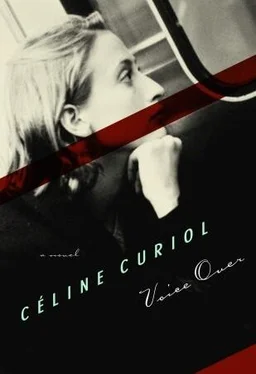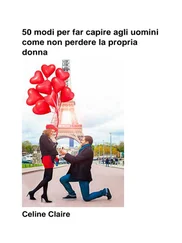Celine Curiol - Voice Over
Здесь есть возможность читать онлайн «Celine Curiol - Voice Over» весь текст электронной книги совершенно бесплатно (целиком полную версию без сокращений). В некоторых случаях можно слушать аудио, скачать через торрент в формате fb2 и присутствует краткое содержание. Год выпуска: 2008, Издательство: Seven Stories Press, Жанр: Современная проза, на английском языке. Описание произведения, (предисловие) а так же отзывы посетителей доступны на портале библиотеки ЛибКат.
- Название:Voice Over
- Автор:
- Издательство:Seven Stories Press
- Жанр:
- Год:2008
- ISBN:нет данных
- Рейтинг книги:5 / 5. Голосов: 1
-
Избранное:Добавить в избранное
- Отзывы:
-
Ваша оценка:
- 100
- 1
- 2
- 3
- 4
- 5
Voice Over: краткое содержание, описание и аннотация
Предлагаем к чтению аннотацию, описание, краткое содержание или предисловие (зависит от того, что написал сам автор книги «Voice Over»). Если вы не нашли необходимую информацию о книге — напишите в комментариях, мы постараемся отыскать её.
Voice Over — читать онлайн бесплатно полную книгу (весь текст) целиком
Ниже представлен текст книги, разбитый по страницам. Система сохранения места последней прочитанной страницы, позволяет с удобством читать онлайн бесплатно книгу «Voice Over», без необходимости каждый раз заново искать на чём Вы остановились. Поставьте закладку, и сможете в любой момент перейти на страницу, на которой закончили чтение.
Интервал:
Закладка:
She is still in bed, studying the outline on the wall of the sun’s rays filtered through the window, when the phone rings. His voice. She can’t believe that he’s calling her so soon, less than twenty-four hours since they last saw each other. From the clipped, cut-off sound of his words, she can tell that he is annoyed. Because of the sweater, no doubt. Ange can’t have appreciated the fact that a piece of plastic was left attached to the material, and he is now going to order her to find a way to get that damn security disc off. He already must have spent the entire morning wearing himself out, directed by Ange’s nervous commands. No, I’m not asleep. It’s about last night. She senses that he is troubled, which makes her uneasy in turn. She could come clean with him about her shoplifting from Promod, but she fears the effect her spur-of-the-moment crime would have on him. It’s about what you told the others. He says that all his friends really believed that she was a prostitute. It can’t have done them any harm to meet one. Did you think you were being clever? He finds it pretty odd to lie like that, for no reason. Such is the paradox of a lie: so long as everyone equates it with truth, they’re prepared to accept it, but the moment a lie is discovered to be a lie, it’s seen as a personal insult. Why should there always be complex reasons for lying? Truth, that endless Chinese box, is not terribly attractive. A lie at least has the merit of being complete and is often far more coherent than its opposite. Apparently she has succeeded in putting off the man applying for the post of boyfriend. They believed me, after all; I must really look the part. From the sound of his breathing in the receiver, she senses that he has relaxed slightly. And this subtle change in mood indicates that he got the message. Her heart reminds her of its presence: something simultaneously shrinks and expands inside her chest. Neither one of them speaks. She waits for him to come out with the usual words, the ones that restrict her to a clearly defined category, the female friend. But this time silence no longer seems enough for him to push on with his usual, pre-formatted phrases. They remain silent, as if to absorb the transformation that is taking place. And through this interruption in the automatic rhythm of their verbal exchanges, she has the sense that, for the first time, they understand each other. For the first time — she can feel it — the thought of a relationship with her has crossed his mind. Eventually he says, Ange is calling me, I have to go.
For a long while she continues holding the phone, half out of the sheets, her head back on the pillow. One by one, she connects the images that have lingered behind her eyes, the specters of distant things. A dreamlike association that she can nevertheless control. The bit of excess skin on her grandmother’s neck which she would push at with her finger, intrigued, whenever the old lady took her in her arms; the two straps and the metal buckles of her enormous satchel which, once she shrugged it off, would leave her feeling as light as a feather; the unease she felt in the damp corridors she had to walk down in order to get to the cellar; her frenzied, heart-clenched dance behind the closed door of her room on the afternoon she saw that her panties were stained with an unfamiliar blood; the igloo she started but never finished because the temperature climbed too fast; the mad dash in an ambulance after she cut her hand open while slicing the Gruyère; the steep climb up the stairs to get to her lesson with Mademoiselle Rousseau, who would become annoyed whenever she crossed her legs while playing the piano; the hours of detention spent gazing out hypnotically at the magnificently empty school playground; the filaments of the climbing rope that would work themselves into her palms while her irate gym teacher yelled at her to get her ass moving; the ridiculous slippers she’d kept on by mistake to go to high school; the comment at the bottom of her report card, year after year the same: inattentive, could do better; the mighty slap she’d received from big Caro in a corner of the playground; the exquisite fur of the neighbour’s cat as it rubbed itself against her legs every afternoon when she came home from school. The pink room in her grandparents’ house. She immediately shuts off the projector in her mind and rubs her hands over her face. The sun has sunk down behind the façade of a building; she shivers.
The more use we make of our memories, the more they turn into fables, which we keep turning over in our minds so as to not forget who we are, their moral serving as our solace or our torture. But let us continue.
11:30 am: she still has some time. She walks up the street towards the market. Between the two rows of parallel stalls, the crowd moves slowly. Shoulders twist right and left, boring a path through the throng. The market-gardeners, with their ruddy, florid complexions, plunge sturdy fingers darkened with vegetable dust into the mounds of produce. In a booming voice, they call out the prices. With rapid, precise gestures, they juggle the colorful, organic forms with the tarnished weights of their scales, the tiny coins and notes, which they lob into a small box set prominently in the midst of their wares. In an open-sided van, a refrigerated Punch and Judy show, a woman in a white apron, her fingers sheathed in plastic, is delicately removing from her display, as if they were precious stones, small round goat’s cheeses, wedges of creamy Brie or rich Comté, fresh eggs, slabs of butter sliced off with cheese wire. She wraps each customer’s order in wax paper. Standing amidst buckets of floating flowers, a man and a woman, their index fingers streaked with cuts from garden shears, are picking out delicately-flowered stems to make a harmonious bouquet, which will then be wrapped in cellophane and showy ribbons and conveyed upside-down to a mother or wife. For her, they are the last remaining survivors. People who still know the earth’s moods, who know that carrots don’t grow on trees, that cheese doesn’t come ready-made from the udders of cows. She loves the resistance and the solidity, the tenacity of these visitors from another world, a world where they don’t need to pile into underground train cars, to breathe in exhaust fumes, or to pretend they don’t hear the amorous panting of their neighbors coming through the wall.
She has spotted a box of raspberries. She slips her way between the bodies warily surveying the goods laid out before them. The stallholder calls her my pretty one and hands her the box wrapped up in brown paper. She plunges her hand inside the bag, eager for the soft, sweet fruit. She gobbles the raspberries down one after the other in rapid succession, leaving drops of pink juice on her fingers. She walks down several streets, scanning the façades for signs of human presence, before being sucked into the warm sickly breath of a métro entrance. Just as she is going through the turnstile, she feels a body insert itself against her back so as to pass through the two metal bars at the same time. She is instantly thrust to the other side and doesn’t get a chance to see the face of the man striding off down one of the long side tunnels. For a few seconds she is left stunned by this contact, as brief as it was powerful. She turns instinctively down a corridor lined with advertising posters, which she scans with a sideways glance without slowing her pace. Just then, a name on one of them catches her eye. She knows that name, knows it because it’s hers. She stops, rereads the first and last name buried in among a list of other names which mean nothing to her. Those are her names, all right. A group of travellers jostles past her, annoyed at finding a stationary body planted there. The poster is for a play that is opening the following week. The names of the lead actors are printed in thick white letters at the top of the bill. Also listed are the producers and the technicians who have worked on the show. Red lettering has been reserved for the box office phone number. She rummages in her bag. She takes out a lidless black ballpoint and uses it to scribble down the number on the raspberry-juice-stained brown paper.
Читать дальшеИнтервал:
Закладка:
Похожие книги на «Voice Over»
Представляем Вашему вниманию похожие книги на «Voice Over» списком для выбора. Мы отобрали схожую по названию и смыслу литературу в надежде предоставить читателям больше вариантов отыскать новые, интересные, ещё непрочитанные произведения.
Обсуждение, отзывы о книге «Voice Over» и просто собственные мнения читателей. Оставьте ваши комментарии, напишите, что Вы думаете о произведении, его смысле или главных героях. Укажите что конкретно понравилось, а что нет, и почему Вы так считаете.












